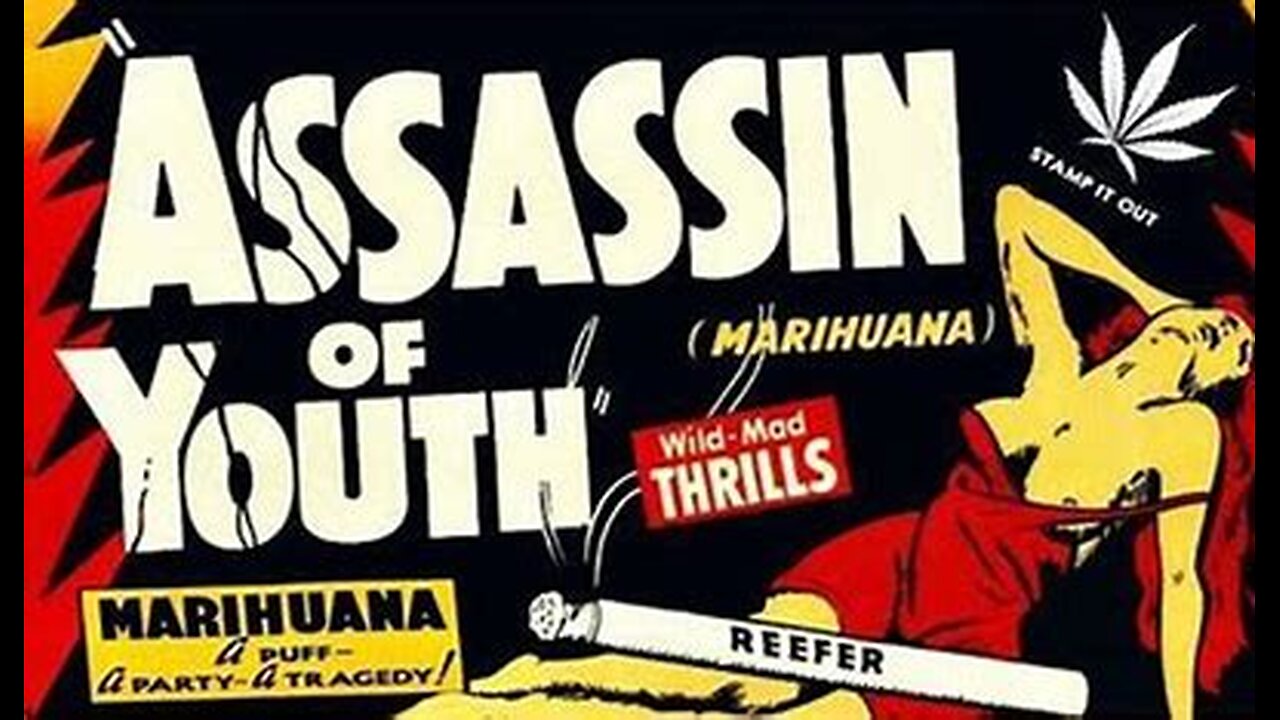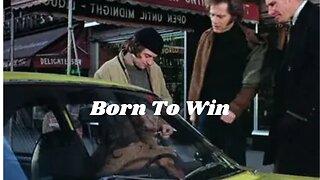Premium Only Content

Assassin of Youth (Crime Drama, 1938)
Assassin of Youth is an exploitation film with elements of crime and drama. It’s a pre-World War II anti-drug propaganda piece, specifically targeting marijuana, and fits into the subgenre of "reefer madness" films popular in the 1930s. These movies were designed to shock audiences with exaggerated warnings about the supposed dangers of drug use, often bypassing the strict Hays Code censorship by marketing themselves as "educational."
Plot
The story revolves around Joan Barrie (Luana Walters), a high-school girl who stands to inherit her late grandmother’s fortune—but only if she adheres to a strict morals clause in the will. Her greedy cousin, Linda Clayton (Fay McKenzie), and Linda’s husband, Jack (Michael Owen), scheme to sabotage Joan’s inheritance by framing her as a marijuana user. They plan to get her caught in compromising situations, like being high in a motel room with Jack. Meanwhile, a young reporter named Art Brighton (Arthur Gardner) goes undercover as a soda jerk to investigate a local gang of teenage "dope fiends" tied to Linda’s drug ring. Art aims to save Joan from ruin and expose the criminals, all while the film hammers home its message about the "horrors" of marijuana. The plot unfolds with melodramatic flair, featuring wild parties, moral panic, and a courtroom climax where the evils of weed are loudly proclaimed.
Cast
Luana Walters as Joan Barrie: The innocent heroine caught in a web of deceit. Walters was a B-movie regular, and her performance here is earnest, if a bit wooden by today’s standards.
Arthur Gardner as Art Brighton: The crusading reporter. Gardner later became a successful TV producer (think The Rifleman), but here he’s a fresh-faced lead with a knack for melodrama.
Fay McKenzie as Linda Clayton: The scheming, blonde villainess who steals scenes with her over-the-top wickedness. McKenzie had a long career, appearing in films into the 1980s.
Michael Owen as Jack Howard: Linda’s partner-in-crime husband. Owen’s role is smaller but pivotal to the plot’s intrigue.
Dorothy Short as Margie Barrie: Joan’s younger sister, who gets tangled up in the marijuana mess. Short also starred in Reefer Madness (1936), making her a staple of the genre.
Earl Dwire as Pop Hardy: A quirky old-timer who provides comic relief with his checker-playing antics. Dwire was a familiar face in Westerns of the era.
Fern Emmett as Henrietta Frisbee: A gossiping scooter-riding busybody who adds humor and resembles Margaret Hamilton (the Wicked Witch from The Wizard of Oz).
Directed by Elmer Clifton, a prolific low-budget filmmaker, the movie was produced by BCM Roadshow Productions for the exploitation circuit—films shown in rented theaters or "roadshows" rather than mainstream cinemas.
Fun Facts
Title Inspiration: The film’s name comes from a 1937 article by Harry J. Anslinger, the U.S. "drug czar," published in The American Magazine and later Reader’s Digest. Titled "Marijuana: Assassin of Youth," it fueled the anti-weed hysteria that birthed movies like this.
Reefer Madness Clone: Often compared to Reefer Madness (1936), Assassin of Youth shares similar themes and even a cast member (Dorothy Short). However, it’s considered less zany and more competently made, though that doesn’t make it "good" by modern standards.
Exaggerated Effects: The film portrays marijuana as turning teens into giggling, violent lunatics or moral wrecks after a single puff—wildly inaccurate but typical of the era’s propaganda. One scene implies a character runs around naked (though nothing is shown), adding to the shock value.
Censorship Dodges: Exploitation films like this skirted the Hays Code by claiming educational intent, allowing them to depict risqué behavior (like drug use and suggestive dancing) that mainstream films couldn’t touch.
Dance Moves: Watch for the "hot dance steps" at the pot parties—lots of hip-shaking and head-jerking that reflect 1930s youth culture, or at least how filmmakers imagined it.
Fern Emmett’s Scooter: Emmett’s character zipping around town on a motorized scooter is a highlight, giving her a proto-Wicked Witch vibe that’s unintentionally hilarious.
Legacy: While not as infamous as Reefer Madness, it’s a cult classic today, enjoyed for its campy overacting and time-capsule view of 1930s anti-drug paranoia.
Assassin of Youth is a fascinating artifact—less a coherent movie and more a loud sermon wrapped in a soap opera. It’s best watched for laughs or historical curiosity, especially if you’re into the quirks of early cinema.
-
 1:24:47
1:24:47
Silver Screen Echoes
12 days agoBorn to Win (Crime, Drama, Dark Comedy, 1971)
32 -
 58:40
58:40
Julie Green Ministries
2 hours agoLIVE WITH JULIE
31.5K86 -
 1:01:10
1:01:10
Crypto Power Hour
10 hours ago $1.39 earnedAnimus Bitcoin Technology
14.4K8 -
 LIVE
LIVE
Game On!
17 hours ago $2.07 earnedAnother FOOTBALL FRIDAY! Weekend Preview And BEST BETS!
299 watching -
 31:55
31:55
ZeeeMedia
18 hours agoHow Gold & Silver Fight Against Digital ID ft. Bill Armour | Daily Pulse Ep 148
7.26K8 -
 13:29
13:29
Clintonjaws
15 hours ago $15.01 earnedCNN Host Stops Show & Plays Surprise Clip Forcing Democrat To Correct Lie
31.5K22 -
 14:55
14:55
World2Briggs
18 hours ago $1.91 earnedThe 10 U.S. Cities Americans Can No Longer Afford — 2025 Edition
9.91K -
 8:19
8:19
Millionaire Mentor
17 hours agoATC Whistleblower EXPOSES Obama’s Dirty FAA Secret
13.4K8 -
 LIVE
LIVE
BEK TV
23 hours agoTrent Loos in the Morning - 11/21/2025
183 watching -
 LIVE
LIVE
The Bubba Army
22 hours agoCHICAGO SUBWAY FIRE ATTACK - Bubba the Love Sponge® Show | 11/21/25
1,579 watching